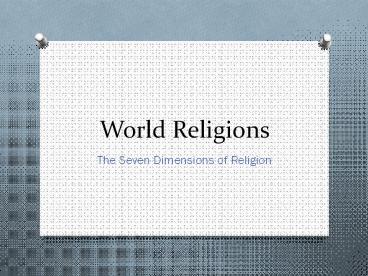World Religions - PowerPoint PPT Presentation
1 / 16
Title:
World Religions
Description:
1. Experiential and Emotional. People experience an emotional reaction to something which they believe is life changing or profound. A focus on the subjective and ... – PowerPoint PPT presentation
Number of Views:126
Avg rating:3.0/5.0
Title: World Religions
1
World Religions
- The Seven Dimensions of Religion
2
The Seven Dimensions of Religion by Ninian Smart
- Experiential and Emotional
- Narrative or Mythic
- Practical and Ritual
- Doctrinal and Philosophical
- Ethical and Legal
- Social and Institutional
- Material
3
1. Experiential and Emotional
- People experience an emotional reaction to
something which they believe is life changing or
profound - A focus on the subjective and emotional what
goes on inside the person - Aims to address what it means to feel the
presence of God - Religious experiences allow us to move beyond
everyday, ordinary experiences to new,
extraordinary levels of consciousness - Religion helps humans to make sense of their
lives by inspiring (and answering) the big
questions (human condition, spiritual
perfection, identity, purpose, etc.)
4
1. Experiential and Emotional
- Religion begins with the religious experience of
individuals - Buddhism ? Prince Gautama experienced
enlightenment under the Bodhi tree and became the
first Buddha - Islam ? Muhammad experienced revelations from
Allah - Judaism ? Abram received contact with God
- Some religions are not so obvious
5
1. Experiential and Emotional
- How People Can Experience Religion
- Faith a person does not have to believe in
specific doctrines but can just have faith in God - Mysticism a person becomes one with the divine
through inward contemplation - Vision Quest is a primal religious practical
mystical experience
6
1. Experiential and Emotional
- Generally speaking, within the theistic
religions, God is experienced as a holy presence
who is other. This presence evokes both fear
and fascination. - Pantheism is another way in which an individual
may experience religion the belief that God is
in all. - In non-theistic religions, religious experience
usually takes the form of mysticism.
7
1. Experiential and Emotional
Abram (Judaism)
Muhammad (Islam)
Prince Gautama (Buddhism)
8
2. Narrative or Mythic
- Myths are often perceived as falsehoods
- They convey important truths in a religious
context - They are non-historical and non-rational but are
sources of sacred truth (therefore, myths are
powerful and give meaning to life) - They are sacred stories passed along orally and
commonly tell of the origins of humans and the
world - They are important because they help guide human
behaviour within a faith community
The story of Creation in the Book of Genesis
9
3. Practical and Ritual
- A formal practice that re-enacts a myth or
sacred story - Symbolic actions (combining words with actions)
- A form of worship
- The Eucharist re-enacts the Last Supper
- The Hajj re-enacts Muhammads return to Mecca
10
3. Practical and Ritual
- Also includes prayer, gatherings, rites of
passage - Rituals are
- sacramental
- performed
- repetitive
- social
11
4. Doctrinal and Philosophical
- The belief aspect of religions
- Belief in creeds, doctrines or teachings
- Are derived from myths and originate from lived
religious experiences - Are often recorded in sacred texts scriptures,
and serve as foundations - Catholics have the Apostles Creed, the doctrine
of the Holy Trinity, and the Paschal mystery
12
4. Doctrinal and Philosophical
- Explain the ideas behind a religion
- Determine what is acceptable and unacceptable
(included and excluded) from religion - Sometimes the cause of violent conflict between
religions
13
5. Ethical and Legal
- Religion shows attention toward ethics
- Ethics moral principles that govern behaviour
(moral correctness) - How we act while living in the world
- Includes sets of teachings that respond to this
question - Links belief with action
- Includes obligations and responsibilities
- Example Ten Commandments and The Golden Rule
14
6. Social and Institutional
- Religious experience moves beyond personal
experience becomes a social experience (creation
of religious communities) - The shared experience of community empowers
individuals and results in organizations of
hierarchy of leaders - Means belonging to a group, tribe, parish, or
congregation
15
6. Social and Institutional
- It is through the social dimension that one
learns a great deal about religion (relationships
help one to connect and share their experience in
a powerful and meaningful way) - Examples Sangha (first community of Buddhist
monks and nuns) Synagogue (Jewish community)
Church (Christian community) Ummah (Islamic
community)
16
7. Material
- Can include sacred architecture, books, music,
art, symbols, places, and nature - The Bible, cathedrals, rivers, statues
- The Ganges for Hindus































